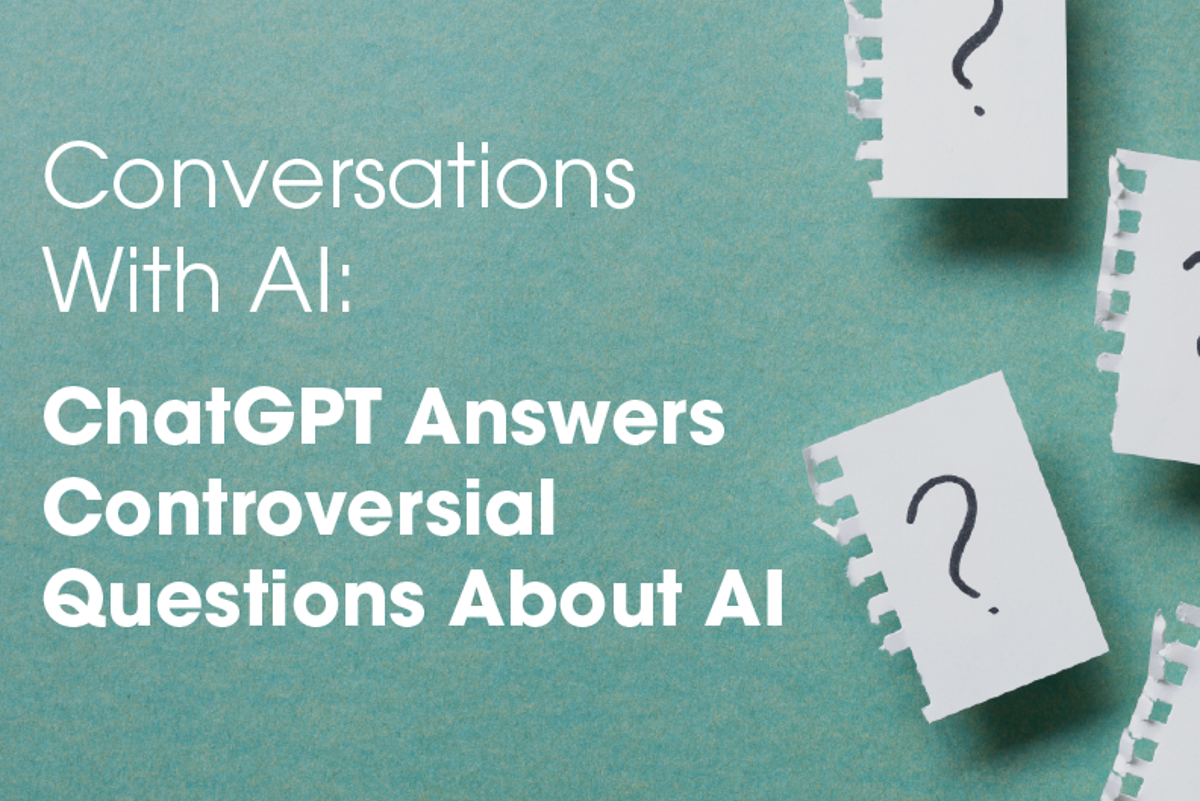
If you've been following along in this series, you've learned a little bit about how ChatGPT and AI are changing how we live. We decided to ask them a few controversial questions about how AI will affect our future.
Question: Where do you get your information from, and are your answers bias?
I am a machine learning model that was trained on a large dataset of text from the internet, books, articles, and websites. The information I provide is based on what I have learned from this dataset. The training data that I was trained on may contain biases, as the information on the internet and in books can reflect the biases of the authors and publishers. However, OpenAI is working to mitigate these biases in the training data, and also monitoring my output to detect and correct any biases that may be present. Additionally, it is important to keep in mind that I am a machine learning model and my responses are based on patterns in the data, it's not a human expert and my answer may not be the only one, or even the best one. It's always good to verify any information that I provide with multiple sources.
Question: Will AI replace Humans?
It is unlikely that AI will completely replace humans in the near future. While AI has the potential to automate certain tasks and improve efficiency, humans bring unique capabilities such as creativity, empathy, and problem-solving skills that machines currently lack. Additionally, AI systems require human oversight and maintenance to operate effectively. However, it's likely that the role of humans in certain industries will change as AI and automation become more prevalent, and it's important for individuals and society to proactively prepare for these changes and the potential impact on employment.
Question: Is artificial intelligence a threat to humanity?
Artificial intelligence (AI) has the potential to bring many benefits to humanity, such as improving healthcare, transportation, and communication. However, like any technology, it also poses certain risks and challenges. Some experts have raised concerns that advanced AI systems could become uncontrollable or unpredictable, leading to unintended harm. Additionally, the increasing automation of jobs may have negative effects on employment and the economy. It's important for society to proactively address these challenges and ensure that the development and deployment of AI is done in a responsible and ethical manner. This can be done through research, regulations, and collaboration between industry, government, and academics.
Question: How will artificial intelligence change the workforce?
Artificial intelligence (AI) is likely to bring significant changes to the workforce. AI systems have the potential to automate many tasks and improve efficiency, which could lead to increased productivity and economic growth. However, this may also result in the displacement of certain jobs, particularly those that involve repetitive or predictable tasks. Additionally, the increasing use of AI could lead to a shift in the types of jobs that are in demand, as well as changes in the skills that workers need to possess.
On the other hand, AI could also create new jobs, such as those related to developing, maintaining, and managing AI systems. It could also change the nature of work in many fields, making jobs more productive, efficient, and in some cases safer.
Overall, it is important for individuals and society to proactively prepare for these changes and the potential impact on employment. This can be done through education and training programs that focus on developing the skills needed for jobs of the future. Additionally, governments and businesses should invest in programs to support workers who are displaced by automation and research on how to ensure that the benefits of AI are shared widely.
Question: What are the risks of AI-assisted fake news?
AI-assisted fake news refers to the use of artificial intelligence (AI) to create and disseminate false information, such as news articles, images, and videos. This can be done through various techniques such as deepfake, text generation, and image synthesis.
The risks of AI-assisted fake news include:
- Misinformation: the spread of false or misleading information can create confusion and mistrust, and can also have negative impacts on individuals, communities and society as a whole.
- Manipulation: AI-generated fake news can be used to manipulate public opinion, influence elections, and spread propaganda.
- Damage to reputation: AI-assisted fake news can damage the reputation of individuals and organizations by spreading false or defamatory information about them.
- Decrease in trust: AI-assisted fake news can erode trust in news and media, and make it more difficult for people to distinguish between credible and unreliable information.
To mitigate these risks, it is important to increase awareness of the issue, to develop technologies and methods to detect and remove fake news, and to support fact-checking efforts. Furthermore, it's important for individuals to be critical consumers of information and to verify the information they receive from multiple sources. Additionally, governments, media organizations, and technology companies should work together to promote media literacy and to establish guidelines and regulations for the use of AI in news and media.